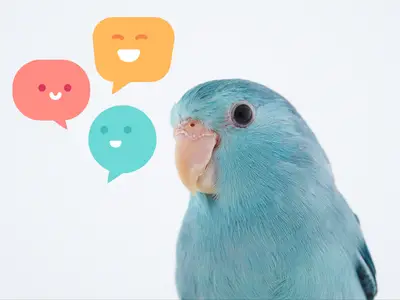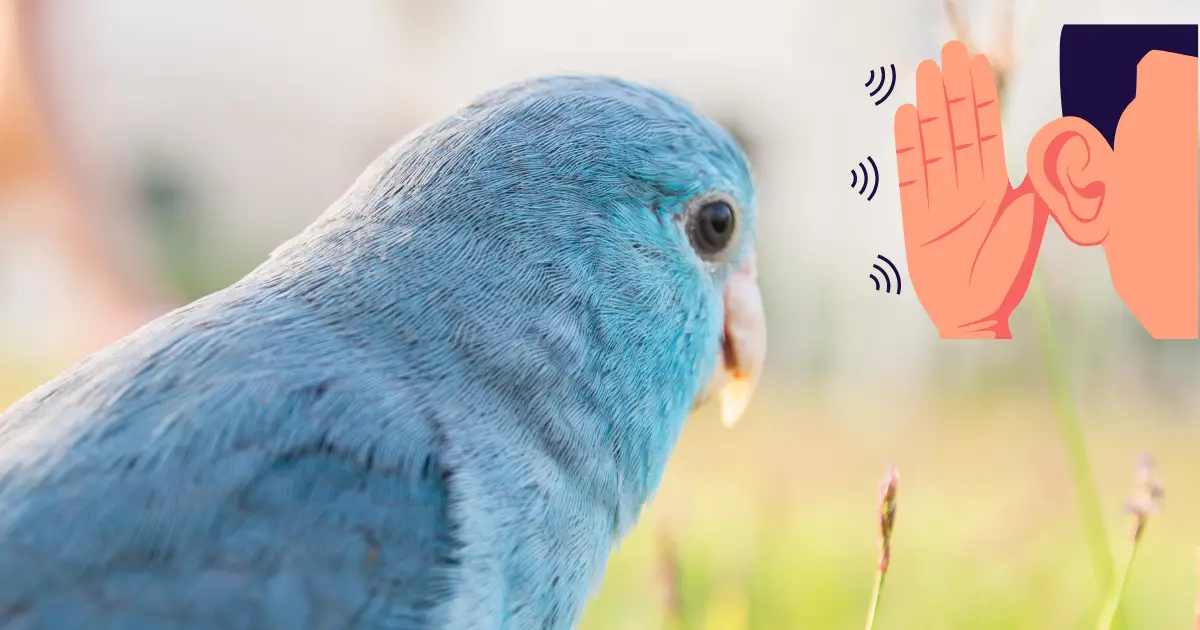
Can Parrotlets Talk?
You’ll have a great time after your Parrotlet gets over his behavioral issues and comes to trust and like you! It is the best feeling in the world the moment you hear your pet parrotlet say the first word or phrase.
Most people often ask the question, can parrotlets talk? because parrotlets although colorful are not as big as the other species of parrot, so it creates concerns for those planning to get parrotlet.
In this article, we will answer all the questions you have about parrotlets and their ability to talk
Let’s dive in.
Can Parrotlets Talk?
Yes, parrotlets can talk. Parrotlets may be able to talk as loud as other parrots but they can learn to talk and over time start to develop impressive vocabularies for a bird their size.
Parrotlets have higher-pitched voices which make them difficult to understand but they can learn to talk clearly with time.
Male parrotlets are generally better at communicating than females, but with time and patience, you may hear your parrotlet repeat a word or phrase!
Can Pacific Parrotlets Talk?
Yes, pacific parrotlets can talk just like the other breed of parrots. They may not be natural talkers like other bigger parrots but they can learn to say a word or two if you take your time to teach them how to talk.
Teaching pacific parrotlets to talk may seem time and energy consuming but there is nothing as fulfilling as seeing them say their first words.
The good thing is that they learn pretty easily. You just need a strategic teaching plan, perseverance, and consistency and the result will blow you away with time.
At What Age Do Parrotlets Start Talking?
Parrotlets start talking as early as possible. Since they are not naturally good talkers like other parrots you may need to help them out a bit with talking training.
They learn pretty fast and can start talking as early as 12 months depending on their capability, and the type of training you give them.
The majority of them will start talking in their 24th month but that is not a problem because you don’t need to pressure them into talking.
All you need to do is develop a clear teaching strategy and focus more on bonding with your parrotlets. You’d be amazed at the speed they learn to talk.
Is It Possible for Parrotlets To Mimic Human Speech?
Yes, it is possible for parrotlets to mimic human speech. Both songbirds and parrotlets can learn and replicate human speech. But a starling relative known as the mynah bird is capable of learning and producing human speech.
Pet parrotlets can learn to speak by mimicking their owners’ voices.
Are Parrotlets Louder Than Budgies?
Parrotlets may not be able to talk as clearly as budgies do but their voices are more high-pitched compared to budgies and other parrot species.
Unlike Budgie that appears joyful all the time, the Parrotlet appears to act intentionally at times. If you have more than one, it’s a rambunctious companion. Except for harsh yells, its voice is less high-pitched than that of a Parrotlet.
Are Parrotlets Good Talkers?
Parrotlets are cute colorful little breeds of parrot that every parrot lover will be delighted to have but one thing is certain, parrotlets are not good talkers and not noisy birds.
Compared to other parrots they are not known as talkers although they can learn to say a few words or phrases if you take the time to teach them.
If you are someone who lives in apartments and is interested in getting a less noisy but colorful parrot then parrotlets are the first choice.
Since they are not known to be the best talkers of the parrot family they are a good option for people living in apartments.
Can You Hear Parrotlets?
Yes, you can hear parrotlets when it talks. Their voices are quite high-pitched compared to other parrots even though they may not talk clearly.
Talking doesn’t come naturally to them like other parrots but when they do learn how to talk you will hear them.
Unlike parrots, they are incapable of squeaking or screeching. As a result, they will chirp lightly in your direction or to themselves to communicate.
What Is The Best Way To Get My Parrotlet To Talk?
A few tips that will help you to effectively get your parrotlet to talk:
- Parrotlets, like humans, have a motive for everything they do. To better understand your Parrotlet, use this concept as a guide. There must be a reason for it to attack you if you get bitten by it. Learn why it bit someone so familiar to you, rather than chastising it.
- You must accept responsibility for how you’ve shaped and stylized your bird’s behavior. if your bird does something that you don’t like, attempt to figure out why the bird did it. You’ll be able to better bond with your Parrotlet if you do this.
- No one should ever force a Parrotlet to do anything it doesn’t want to do. They’re not wired that way. As an alternative, use positive reinforcement to help your Parrotlet learn new skills.
- When your bird accomplishes something you want, praise it and offer a treat to celebrate its wins. What you like and what you don’t like will be evident in this way. Punishment extends beyond the gorgeous array of hues!
- A Parrotlet owner’s biggest challenge is teaching their parrot to speak. This is a grueling undertaking. You’ll need to be a strict but loving trainer if you want this job. To get your Parrotlet to mimic new noises, you’ll need to come up with creative strategies.
- You’ll soon learn that teaching your avian companion the first word is possibly the most challenging assignment you’ve ever had to deal with.
- Don’t give up, though. Develop a strategy and follow it strictly you’ll forget about all the stress involved when you hear your parrotlet just say one word.
- To succeed, you’ll need a lot of both patience and perseverance. The only way to see Parrotlets as anything other than young children is to comprehend and accept this. They are utterly devoid of a personal lexicon. You will have to help them learn. To speak, they must mimic what they hear. Over and over, you must recite phrases or sentences so that your pet can become familiar with various sounds.
It’s more likely that they’ll recall words if they’ve heard them a lot. A close inspection helps parrotlets pick up on new noises they hear.
As a result, one of the most effective strategies is to start a conversation with your Parrotlet as soon as you have it.
The best way to communicate with your pet is to use simple, colloquial language, but not in a childlike tone.
Everything you say about anything and everything should be listened to by it.
Teaching parrotlet does not have to be difficult, as you will soon learn. It’s a lot of fun. As a result, you’ll have a new best friend in a matter of days who will be able to listen to all of your concerns.
Repetition As A Training Method
As they grow up, Parrotlets mimic their parents’ vocalizations to communicate. You are removing them from their native environment when you bring them home.
As a result, the situation is delicate, as you can probably tell. You as the “surrogate parent” of a Parrotlet will only help it to speak if you give it enough encouragement to do so.
You are the only one who can teach a Parrotlet to mimic your voice. There are a few simple words and phrases that he will quickly pick up, such as “Hello,” “Up,” and “Hi.”
This has always been an excellent place to start. Don’t expect too much at first, even if your Parrotlet is repeating everything you say.
A six-month-old infant, no matter how bright she is, cannot and will not learn the “Gettysburg Address.”
When your Parrotlet is babbling incoherently, you may want to give it intensive pronunciation training right away. Halt! Be patient; it will all work out in the end. Give him more of your attention and give him more time. It’s going to get a lot of use out of it. Learning is a lengthy process that requires a lot of effort.
Were you one of those students who mastered everything in school in a flash? What if your Parrotlet learns everything gradually and steadily?
An effective learning session involves a lot of patience and sensitivity, regardless of whether the subject is intelligent or not.
Teaching your Parrotlet to talk and communicate with its human family isn’t as simple as following a set of rules. And why the haste?
You won’t be fired if your Parrotlet doesn’t pick something up today, next week, or even in the next two months! Parrotlets will take time to raise.
Everyone has their learning style and pace. By the time your pet reaches 2 or 3 years of age, he or she may surprise you by becoming an enthusiastic speaker. These are real events; don’t you doubt it. They are based on actual events.
Conclusion: Can Parrotlets Talk?
You can teach parrotlets a few words and phrases, but they can’t talk as much as other types of parrots.
Start by frequently conversing with your bird. When you speak to it, the more likely it is to pick up a language.
Repeat what you want your parrotlet to say.

Hi, I am Thersa and Welcome to ParrotKeen, your number one place to get all the information you need about your cute parrot. I hope You Find it useful.

